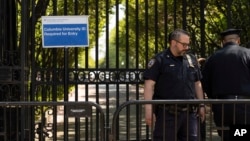Student Union
- By Hau Hoang
How to Speak English Fluently?
The most popular question I get from my friends in Vietnam is how to speak English fluently and correctly. I realize that it is a aching question that not just my friends, but also learners of this global language are trying to answer. In my case, even though I was taught English since the beginning of middle school in Vietnam, the things I learned then were barely adequate to carry out a conversation or even write up a letter in correct grammar.
In 9th grade, I decided to focus on studying English intensively on my own, which helped me land a scholarship to study in America through an exchange program – a thrilling turn for my education.
Obviously, being in the native speaking environment was a golden advantage, but at the same time, I still had to study and practice the language. By the end of high school, I was very confident with my English skills. All of my hard work paid off even more in college, because the classes at St. John’s College are discussion-based, so there’s a lot of talking.
Here are some of the things that worked for me when I was learning English. Since everyone has a different learning style, what worked for me won’t necessarily be best for you, but hopefully this will at least help you along.
Listen as much as possible
As I recall, the pronunciation I was taught in middle school in Vietnam are mostly incorrect. This is a common case because English pronunciation is not at all straightforward. There is nothing like the difficulty in trying to pronounce some of English's most difficult words. For me, the toughest words to master were words like "weird," "judge," and "noodle."
What helped was listening to native English speakers as much as possible, either through tapes, CDs, movies, or most prominently, the internet. I’m not exaggerating in saying that American movies and music were my principal English teachers in 9th grade. I would buy CDs of Westlife and Britney Spears, download the lyrics and sing along to the songs. And once in a while, my sister would bring me from Hanoi DVDs of American movies which I would watch over and over, and practice reading the subtitles along with the actors. I can still recite word-by-word the whole script of Mean Girls.
In this way, my English study was basically an immersion, though indirect, in the English language as well as the American culture. My pronunciation and speaking skill therefore improved very quickly. I got to learn the real English – what real Americans say to each other in everyday life; for example, saying "How are you doing?" instead of the ordinary "How are you?"
Judge yourself
When you practice speaking by repeating along with a recording, be somewhat hard on yourself, try to imitate as close as possible to the speaker's pronunciation, and most importantly, the intonation of the sentence - this will help you carry out a more natural and smooth conversation in English.
It is also very helpful to have a dictionary with International Phonetics Alphabet (IPA) pronunciation (I recommend Oxford, Macmillan, or Dictionary.com for those who have home internet access). Of course, the first step would be to learn how to read the IPA symbols (some YouTube videos can help teach you that). I always use this guide to learn the pronunciations of new words, and also to make sense of the pronunciation in the recording.
Specifically, by looking at the "anatomy" of the pronunciation, you will be able to greatly improve your pronunciation. For example, since Vietnamese words all have one syllable, a lot of Vietnamese pronounce the word “hôm” for “home” since their sounds are seemingly equivalent. When you look up the IPA pronunciation of this word, however, you will see that it actually consists of two syllables /ho-ʊm/. As a result, you should practice perfecting your pronunciation by saying the two syllables separately and quickly. Eventually it will become an instinctive thing to pronounce “home" in that correct manner.
Variety is key
For me, the key to speaking English fluently is sentence structures. The more structures you know, the more comfortable you will be when trying to express your thoughts.
My advice would be try to master the fundamental structures - “for example,” “I think that,” “it is interesting that,” “I find it,” “it is better to,” “not only … but also” - by practicing them over and over. A good familiarity with the structures will help with the coherence of the conversation.
As you expand your knowledge in sentence structures, it is also important to augment your vocabulary. It is always wise to constantly try new words in conversation due to the mutual relationship between speaking and learning new words: you need more words to express your thoughts precisely, and at the same time, it is easiest to learn new words when they are uttered and put in context.
Learning to speak English fluently is a difficult task. On top all of the tips I listed above, my final advice would be to practice as much as possible because really, practice makes perfect. Good luck everyone!
See all News Updates of the Day
Columbia University cancels main commencement after protests that roiled campus for weeks

Columbia University is canceling its large university-wide commencement ceremony amid ongoing pro-Palestinian protests but will hold smaller school-based ceremonies this week and next, the university announced Monday.
"Based on feedback from our students, we have decided to focus attention on our Class Days and school-level graduation ceremonies, where students are honored individually alongside their peers, and to forego the university-wide ceremony that is scheduled for May 15," Columbia officials said in a statement.
The protests stem from the conflict that started Oct. 7 when Hamas militants attacked southern Israel, killing about 1,200 people, mostly civilians, and taking roughly 250 hostages. Vowing to destroy Hamas, Israel launched an offensive in Gaza that has killed more than 34,500 Palestinians, about two-thirds of them women and children, according to the Health Ministry in the Hamas-ruled territory. Israeli strikes have devastated the enclave and displaced most of its inhabitants.
The University of Southern California earlier canceled its main graduation ceremony while allowing other commencement activities to continue.
- By VOA News
Where Are Pro-Palestinian Campus Protests Happening?

Colleges in the U.S. have been rocked by a wave of campus protests calling for an end to the war in Gaza, and for U.S. colleges to divest from Israel.
The Wall Street Journal’s Steven Russolillo rounds up some of the most important ones. (April 2024)
Pro-Palestinian protests in US could impact 2024 election
Despite the fact that many of their encampments at university campuses have been dismantled, pro-Palestinian demonstrators in the United States are standing their ground. If the protests continue, some analysts say they could have an impact on the 2024 presidential election. VOA’s Veronica Balderas Iglesias explains.
- By VOA News
Pro-Palestinian protest ends quietly at University of Southern California

Pro-Palestinian protesters at an encampment at the University of Southern California, one of the focal points of anti-Israel protests across U.S. college campuses, left the scene early Sunday after authorities warned them that they could be arrested.
Their departure came after university safety officers and Los Angeles police began clearing the center of campus, where police had arrested 93 people on April 24.
"If you are in the center of campus, please leave,” the university warned the protesters on the social media platform X, saying they could be arrested if they stayed.
Elsewhere, pro-Palestinian protests continued at several college graduation ceremonies on Saturday.
At the University of Virginia, 25 people were arrested for trespassing after police clashed with pro-Palestinian protesters who refused to remove tents from the campus.
At the University of Michigan, demonstrators chanted anti-war messages and waved flags during graduation ceremonies. More protests occurred at Indiana University, Ohio State University, Princeton University in New Jersey and Northeastern University in Massachusetts.
- By VOA News
Amid internship pressure, international students should focus on self-care

That’s the argument of Edhita Singhal, an international student from India studying at the University of Southern California.
Despite the fear of not finding a good internship, it’s important to relax and take care of yourself, she writes in her biweekly column for campus newspaper The Daily Trojan. (April 2024)












